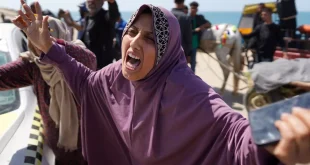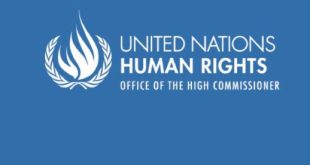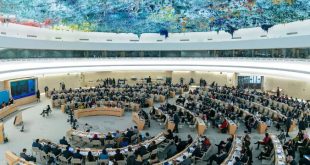Mary Robinson, former President of Ireland and former UN High Commissioner for Human Rights, was appointed last week as the secretary-general's Special Envoy to the Great Lakes region of Africa. Credit: UN Photo/Ky Chung
– A potential ad from the United Nations to be placed in a weekly London newsmagazine could possibly read: Vacancy for ex-head of government or ex-head of state; lucrative globe-trotting political assignments in Asia, Africa or Latin America; attractive per diem; first or business class travel; five star hotels; and guaranteed diplomatic immunity (including from the International Criminal Court).
Clearly, the United Nations is fast turning out to be a blissful second home for unemployed former world leaders – proving there is life after retirement, resignation or being kicked out of office.
As part of a growing trend, Secretary-General Ban Ki-moon, who has held office since Jan. 2007, has been naming former prime ministers and presidents either as agency heads or as U.N. Special Envoys.
The newest entrant to the elite group is Mary Robinson, former Irish president (1990 to 1997), who was appointed last week as the secretary-general’s Special Envoy to the Great Lakes region of Africa.
Robinson was also U.N. High Commissioner for Human Rights during 1997-2002 and was appointed to that post by former Secretary-General Kofi Annan.
The more recent political leaders on a U.N. salary or a U.N. per diem include: Romano Prodi, prime minister of Italy (1996-1998 and 2006-2008) as U.N. Special Envoy for the Sahel and Jose Ramos-Horta, president of Timor-Leste (2007-2012) as head of the U.N. Integrated Peacebuilding Office in Guinea-Bissau.
Another ex-head of government, Jorge Sampaio, president of Portugal (1996-2006), quit last month as High Representative of the U.N. Alliance of Civilizations (UNAOC) after completing his term of office since April 2007.
Last week, Michelle Bachelet, former president of Chile (2006-2010), stepped down as Under-Secretary-General (USG) for U.N. Women, where she was heading the U.N.’s newly-minted office since July 2010.
Bachelet said she was resigning for “personal reasons” but the speculation in the corridors of the U.N. is that she is planning to run once again for president of Chile.
Another former head of government, Helen Clark, prime minister of New Zealand (1999-2008), was the first woman to be appointed as administrator of the U.N. Development Programme (since April 2009), and also chair of the U.N. Development Group.
Although her four-year term ends next month, there are strong indications the secretary-general will renew her tenure for an additional four years.
The secretary-general’s appointments for agency heads (including U.N. Development Programme, U.N. Population Fund, U.N. children’s agency UNICEF) have all to be confirmed by the 193-member General Assembly, the U.N.’s highest policy making body.
But no appointments have been rejected so far.
Another pending appointment is the secretary-general of the Geneva-based U.N. Conference on Trade and Development (UNCTAD), which falls vacant later this year.
At a diplomatic reception last week, a senior U.N. official was heard confessing to a group of envoys about a proposal to appoint former French President Nicolas Sarkozy (2007-2012) as a Special Envoy for a political hotspot in Africa.
The French government, which considers Sarkozy a discredited politician, was apparently outraged about the proposed appointment.
As a result, the proposal never got off the 38th floor of the secretary-general’s office.
When Ban named a 27-member High-Level Panel to advise him on the global development framework for the U.N.’s post-2015 agenda, he went one step higher: he picked three current heads of government to co-chair: President Susilo Bambang Yudhoyono of Indonesia, President Ellen Johnson Sirleaf of Liberia, and British Prime Minister David Cameron.
Chakravarthy Raghavan, a veteran journalist who covered the United Nations during 1962-71 and a one-time president of the U.N. Correspondents Association (UNCA), told IPS, “I can’t recall any such highflying personalities/heads of governments or states being named special envoys or to top U.N. posts.”
He said there were one or two cases from Central America or Latin America, where governments had been overthrown in coups, and personalities from overthrown governments were appointed.
Jose Rolz-Bennet of Guatemala was one such appointment – as USG for Special Political Affairs – under then Secretary-General U.Thant (1961-71).
Raghavan, who currently covers the United Nations in Geneva, said, “I think it was only (Secretary-General) Boutros Boutros-Ghali (of Egypt) who tried to equate his job with that of a head of state, and would visit only those countries that agreed to extend that kind of status to him.”
Until then, he said, secretaries-general were treated on par with foreign ministers, and it was foreign ministers who signed credentials of U.N. permanent representatives and delegates to the General Assembly.
“Boutros did name some special envoys, as did Kofi, but they were mainly people who had been ambassadors at the U.N.”, said Raghavan.
The inflation of jobs as special envoys at USG levels, and then former heads of states as special envoys or to U.N. secretariat posts perhaps began then, he added.
“But Ban Ki-moon has really a very high opinion of himself, and may be preparing himself, after leaving office, to run for high office in Korea,” said Raghavan.
Asked if these politicians are qualified for their jobs purely because they were either former heads of government or current heads, James A. Paul, senior advisor at the Global Policy Forum (GPF), told IPS, “Frankly, it depends on who they are and what kind of a job we can expect of them.
“The problem is not this, it seems to me, but rather the general decline in effectiveness of the U.N. in this period, the abysmally low level of leadership offered by the present secretary-general, and the determination of the great powers to defend a grossly unstable and unjust global order by all means necessary,” said Paul, a longstanding U.N. expert and former GPF executive director.
Raghavan told IPS that some smaller member countries did name prominent personalities as their envoys to the U.N. – but that was probably to get them out of domestic politics, and keep them busy elsewhere.
“But that is entirely different from the U.N. head appointing such people to serve under him,” he said.
And every secretary-general, he noted, seems to make his predecessor look better.
Post Disclaimer | Support Us
Support Us
The sailanmuslim.com web site entirely supported by individual donors and well wishers. If you regularly visit this site and wish to show your appreciation, or if you wish to see further development of sailanmuslim.com, please donate us
IMPORTANT : All content hosted on sailanmuslim.com is solely for non-commercial purposes and with the permission of original copyright holders. Any other use of the hosted content, such as for financial gain, requires express approval from the copyright owners.
 Sri lanka Muslims Web Portal Sri Lanka Muslims News Center
Sri lanka Muslims Web Portal Sri Lanka Muslims News Center

 Donate
Donate


